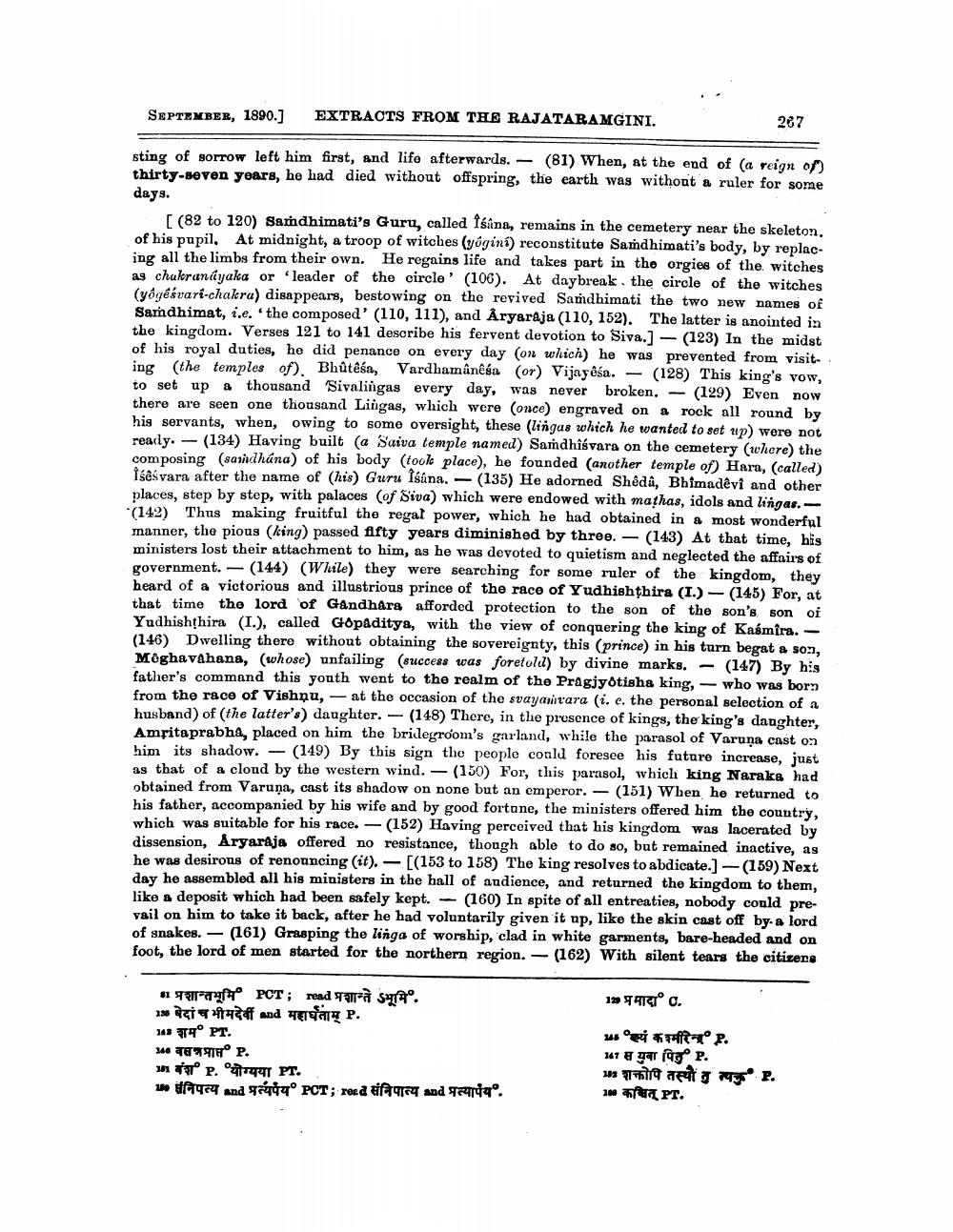________________
SEPTEMBER, 1890.]
EXTRACTS FROM THE RAJATARAMGINI.
sting of sorrow left him first, and life afterwards. (81) When, at the end of (a reign of) thirty-seven years, he had died without offspring, the earth was without a ruler for some days.
81 प्रशान्तभूमि° PCT ; read प्रशान्ते ऽभूमि
196 बेदां च भीमदेव and महार्घताम् P.
148 शम° PT.
-
-
[(82 to 120) Samdhimati's Guru, called féâna, remains in the cemetery near the skeleton. of his pupil. At midnight, a troop of witches (yógini) reconstitute Samdhimati's body, by replacing all the limbs from their own. He regains life and takes part in the orgies of the witches as chakranayaka or leader of the circle' (106). At daybreak. the circle of the witches (yégésvari-chakra) disappears, bestowing on the revived Samdhimati the two new names of Samdhimat, i.e. the composed' (110, 111), and Aryaraja (110, 152). The latter is anointed in the kingdom. Verses 121 to 141 describe his fervent devotion to Siva.] (123) In the midst of his royal duties, he did penance on every day (on which) he was prevented from visiting (the temples of). Bhûtêsa, Vardhamânêsa (or) Vijayêsa. (128) This king's vow, to set up a thousand Sivalingas every day, was never broken. (129) Even now there are seen one thousand Lingas, which were (once) engraved on a rock all round by his servants, when, owing to some oversight, these (lingas which he wanted to set up) were not ready. (134) Having built (a Saiva temple named) Samdhiśvara on the cemetery (where) the composing (sandhana) of his body (took place), he founded (another temple of) Hara, (called) Isêsvara after the name of (his) Guru Isâna. (135) He adorned Shêdâ, Bhimadêvi and other places, step by step, with palaces (of Siva) which were endowed with mathas, idols and lingas. - (142) Thus making fruitful the regal power, which he had obtained in a most wonderful manner, the pious (king) passed fifty years diminished by three. (143) At that time, his ministers lost their attachment to him, as he was devoted to quietism and neglected the affairs of government. (144) (While) they were searching for some ruler of the kingdom, they heard of a victorious and illustrious prince of the race of Yudhishthira (I.) (145) For, at that time the lord of Gandhara afforded protection to the son of the son's son of Yudhishthira (I.), called Gopaditya, with the view of conquering the king of Kasmira. - (146) Dwelling there without obtaining the sovereignty, this (prince) in his turn begat a son, Mêghavahana, (whose) unfailing (success was foretold) by divine marks. (147) By his father's command this youth went to the realm of the Pragjyotisha king, who was born from the race of Vishnu, at the occasion of the svayamvara (i. e. the personal selection of a husband) of (the latter's) daughter. (148) There, in the presence of kings, the king's daughter, Amritaprabha, placed on him the bridegroom's garland, while the parasol of Varuna cast on him its shadow. (149) By this sign the people could foresee his future increase, just as that of a cloud by the western wind. (150) For, this parasol, which king Naraka had obtained from Varuna, cast its shadow on none but an emperor. (151) When he returned to his father, accompanied by his wife and by good fortune, the ministers offered him the country, which was suitable for his race. (152) Having perceived that his kingdom was lacerated by dissension, Aryaraja offered no resistance, though able to do so, but remained inactive, as he was desirous of renouncing (it).-[(153 to 158) The king resolves to abdicate.] (159) Next day he assembled all his ministers in the hall of audience, and returned the kingdom to them, like a deposit which had been safely kept. (160) In spite of all entreaties, nobody could prevail on him to take it back, after he had voluntarily given it up, like the skin cast off by a lord of snakes. (161) Grasping the linga of worship, clad in white garments, bare-headed and on foot, the lord of men started for the northern region. - (162) With silent tears the citizens
-
340 वसत्र प्राप्त P.
301 वंश P. योग्यया PT.
180 संनिपत्य and प्रत्यर्पय' POT; rend संनिपात्य and प्रत्यार्पय
-
-
267
120 प्रमादा' C.
14 एवं कश्मीरेन्द्र P.
167 स युवा पितु' P.
18 शक्तोपि तस्थौ तु न्य P.
100 कचित् PT.




